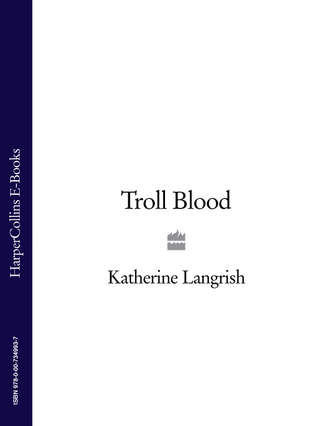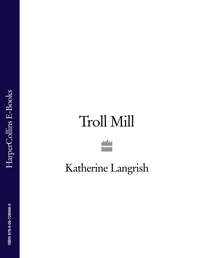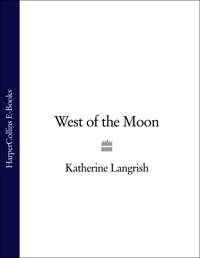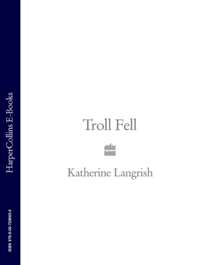
Полная версия
Troll Blood
Sinumkw looks at him. His chest rises and falls in a sigh. “Well, we can try. Perhaps the cub is young enough to tame. Don’t be surprised if he bites you.”
They turn, for the slope ahead is too steep to descend, and it will be necessary to go back into the woods and find another way down. Kwimu casts a backward glance at the burning vessel, and is in time to see it tip up and slide neatly backwards under the water. The snarling serpent head vanishes last, and then it’s as though it has never existed, except for the smoke drifting higher and higher, a fading stain against the sky.
The other jipijka’m is already out of the bay and turning up the gulf towards the open sea; and from this distance it looks more like a serpent than ever—a living serpent, swimming quietly away through the haze.
Down on the shingle, nine-year-old Ottar, young son of Thorolf the Seafarer, stands knee-deep in the cold waves. Tears pour down his cheeks. He’s alone, orphaned, desperate, stranded in this horrible place on the wrong side of the world. He hears a shout from the beach behind him. He turns, his heart leaping in wild, unbelieving hope. Somehow it’s going to be all right—it’s been a bad dream or an even worse joke—and he won’t even be angry. He’s going to run to whoever it is, and cling to them, and sob until the sobbing turns into laughter.
And then he sees. His mouth goes dry. Coming towards him on the rising ground between him and the houses are two terrible figures. Their long hair is as black as pitch, and tied with coloured strings. Their clothes are daubed with magic signs. Furs dangle from their belts. They are both carrying bows. But the frightening thing—the really frightening thing about them—is that you can’t see their expressions at all. Half of their faces are covered in black paint, the other half in red. Their eyes glitter white and black.
“Skraelings!” Ottar whispers. “Dirty Skraelings!”
He prepares to die.
CHAPTER 2 Water Snake
The green sea wrapped itself round Peer Ulfsson’s waist, and rose to his chest with a slopping sound. “Yow!” he yelled. As the wave plunged past he sucked in his breath, and bent quickly to look through the water.
There! In the heaving, brown-green glimmer he saw it: the hammer he’d dropped, lying on the stones. He groped with his arm, his fingers closed on the handle, and the next wave swept past his ears and knocked him over. There was a dizzy moment of being rolled backwards in a freezing froth of bubbles and sand. He struggled up, spluttering but brandishing the hammer in triumph.
“Got it!”
“So I see.” Bjørn’s face was one wide grin. “If you’d tied it to your wrist like I told you, you wouldn’t have had to do that. Get dressed; you look like a plucked chicken.”
Peer laughed through chattering teeth. He bounded back to shore and dragged his discarded jerkin over his head, fighting wet arms through the sleeves. It fell in warm folds almost to his knees, and he hugged his arms across his chest. “Aaah, that’s better. I’ll leave my breeches till I’ve dried off a bit…What’s that? Who’s shouting?”
Torn by the wind, an alarmed cry had reached his ears. He couldn’t make out the words. Up on the jetty Bjørn stiffened, shading his eyes to look down the fjord. “It’s Harald. He’s seen a ship.Yes—there’s a strange ship coming.”
Peer jumped up beside Bjørn, noticing with pride how firm and solid the jetty was. The two of them had been building it for almost a month now, in between their other work, and in Peer’s opinion it made the tiny beach at Trollsvik look like a proper harbour. It was a stout plank walkway between a double row of posts. Bjørn’s new faering, or fishing boat, bobbed beside it.
He joined Bjørn at the unfinished end, where the last few planks waited to be nailed down. It was late afternoon, the tide flowing in. Out where the shining fjord met the pale spring sky he saw a large, reddish sail, square-on, and the thin line of an upthrust prow like the neck of a snail. A big ship running into Trollsvik before the wind.
“Who is it?” he blurted.
Bjørn didn’t take his eyes off the ship. “I don’t know. Don’t know the sail. Could be raiders. Best not take chances. Run for help, Peer. Tell everyone you can.”
A lonely little village like Trollsvik could expect no mercy from a shipful of Viking raiders if they took the place by surprise. The best thing was to meet them with a show of force. Peer turned without argument. Then he saw a scatter of people hurrying over the dunes. “Look, Harald’s raised the alarm already. Here he comes, with Snorri and Einar…”
“Hey, Harald!” Bjørn bawled at the top of his voice. “Whose ship is that?”
A bandy-legged man with straggling grey hair raised an arm in reply as he puffed across the shingle and climbed painfully on to the jetty. “No idea,” he wheezed, bending double to catch his breath. “I was cleaning my nets—looked up and saw it. Shouted at you and ran for the others.You don’t know it, either?”
“Not me,” said Bjørn. Peer looked at the ship—already much closer—then back at the little crowd. Most of the men had snatched up some kind of weapon. Snorri One-Eye carried a pitchfork, and old Thorkell came hobbling along with a hoe, using the handle as a walking stick. Einar had a harpoon. Snorri’s fierce, grey-haired wife Gerd came limping after him over the stones, clutching a wicked-looking knife. Even Einar’s two little boys had begun piling up big round stones to throw at the visitors. Peer wondered if he should join them.Then he realised he was holding a weapon already. His hammer.
He hefted it. It was long-handled and heavy. The dull iron head had one flat end for banging big nails in. The other end tapered to a sharp wedge. When he swung it, it seemed to pull his hand after it. As if it wanted to strike.
Could I really hit anyone with this? He imagined it smashing into someone’s head, and sucked a wincing breath.
The neighbours were arguing. “No need to fear!” yelled Gerd, lowering her knife. “See the dragonhead? That’s Thorolf’s ship, that is, the old Long Serpent that Ralf Eiriksson sailed on.”
“It never is!” Snorri turned on his wife. “Thorolf’s been gone two years now, went off to Vinland.”
“So what?” Gerd was undaunted. “He can come back, can’t he?”
“Fool of a woman,” Snorri shouted. “That’s not his ship, I say!”
“How d’you know?” Gerd shrilled.
“Because this one’s as broad in the beam as you are, that’s why—the Long Serpent was narrower…”
“That isn’t the Long Serpent,” said Peer. “I should know. My father helped to build her.”
“This ship looks like a trader,” Einar said. “Built for cargo, not war.”
“That’s all very well, Einar. Plenty of traders turn into raiders when it suits them—doesn’t mean her crew won’t fight.”
“What do you think, Bjørn?” asked Peer in a low voice.
Bjørn gave him an odd glance, half-humorous, half-sympathetic. “I don’t know, Peer. Let’s just put on a good show and hope they’re friendly.”
Peer stood unhappily clutching his hammer. The ship was so close now that he could see the sea-stains on the ochre-red sail. The hull was painted in faded red and black stripes. A man stood in the bows, just behind the upward swoop of its tall dragon-neck.
We could be fighting in a few minutes. A gull shrieked, swooping low overhead and its keen cry made him jump. Odd to think that the gull might soon be swinging and circling over a battle, and that its shrieks might be joined by the screams of wounded or dying men and women. I might die… And with a jump of his heart he thought of his best friend Hilde, safe for the moment at her father’s farm on Troll Fell. What if he never saw her again? And what would happen to her if these men were dangerous?
There was a flurry of activity on board. The yard swung and tipped, spilling wind. Down came the sail in vast folds. Oars came out to guide the ship in. Behind Peer and Bjørn, the villagers bunched like sheep.
The man in the bows leaned out, cupped a hand round his mouth and yelled, “Bjørn!”
Bjørn threw his head up. “Arnë!” he shouted back. “Is that you?”
Arnë, Bjørn’s brother! The villagers broke into relieved, lively chatter. Peer unclenched stiff fingers from the haft of his hammer. He wouldn’t have to use it as a weapon after all. And a good thing, too, said a secret little voice at the back of his head, because you know you couldn’t have hit anyone.
The thought bothered him. Was it true? Would he be no good in a fight? The word coward brushed across his mind. Then, with a shrug that was half a shudder, he dismissed the idea. It didn’t matter now.
“The ship’s called Water Snake,” Arnë shouted across the narrowing gap of water. “Gunnar Ingolfsson’s the skipper. I’ve brought him here to meet Ralf Eiriksson.”
“Who’s this Gunnar? Why does he want Ralf?” Peer wondered aloud, as the ship closed on the jetty.
“Gunnar Ingolfsson. Gunnar…” Bjørn snapped his fingers. “He’s the man Thorolf took on as a partner, a couple of years ago. Got a name as a sea rover, a bit of a Viking. Thorolf and he sailed off to Vinland together in two ships. So what’s he doing here, and why’s Arnë with him?”
Peer shrugged. He wasn’t curious about Arnë.
“Vinland? Vinland?” muttered Einar. “Where’s that?”
“Don’t you remember?” Snorri said helpfully. “A few years back, Ralf and Thorolf got blown off course and found a new land all covered in forests…”
“The land beyond the sunset,” Peer said eagerly.
“I knew that,” Einar huffed, “but I thought they called it Woodland.”
“They did!” Snorri waved a triumphant finger. “But other ships went there and found vines. Vines, Vinland, see? It’s all the same coast. This Gunnar must be making a second trip. I’ve heard you can bring back a fortune in timber and furs and grapes. I’ve got half a mind to go myself.”
“Ho, yes,” scoffed Einar. “And how would you know what a grape looks like? Have you ever seen one?”
“Arnë’s a wild one,” Bjørn said to Peer. “What’s he done with his fishing boat? Sold it, I suppose, to join this trip. Well, he’s crazy, that’s all.”
“He always wanted to go a-Viking,” Peer pointed out.
“I know.” Bjørn grinned suddenly. “That’s why I say he’s crazy!”
Peer nodded. And that’s why Hilde likes him, he thought, as a black-edged cloud slipped over the sun. The hills and the shore and the flashing water lost their colours. The jetty he had taken such pride in suddenly seemed a rough-and-ready thing of no interest. He wished he could do something exciting or brave.
How was it that Arnë always managed to do things that would impress Hilde? Of course, it helped that he was tall, strong and good-looking. And seven years older than Peer—girls took older men more seriously. If he’s sailing off to Vinland, I won’t get a word in this evening, then. She’ll be talking to Arnë all night.
The big ship came nudging up to the jetty. Seven or eight men were busy on board, stowing the yard fore and aft, lifting the oars in, collecting their gear. Arnë threw a rope up to Bjørn. “Nice new jetty,” he called, laughing. “Did you build it specially for us? It’s good, this’ll be easier for Astrid.”
“Astrid?”
“The skipper’s wife.”
Everyone stared. Peer got a glimpse of a girl in a blue cloak, huddled under an awning which had been rigged up behind the mast. Arnë climbed on to the jetty and wrung Bjørn’s hand. He clapped Peer on the shoulder and said, “Fancy a voyage to Vinland?” before turning to offer a helping hand to the girl. She was finding it difficult, clutching some kind of pouch or bag. A giant of a fellow with a shock of almost white fair hair tried to boost her up from the ship.
Peer watched scornfully. Hilde wouldn’t need helping out of a boat. She’d just kilt up her dress and jump out, laughing!
Hilde, Hilde! She teased Peer, bossed him about, and drove him crazy. Last spring, he’d made the mistake of impulsively kissing her, and she’d laughed at him. He hadn’t dared to do it since, except in dreams.
We belong together, he thought. She’d been his best friend and ally for years, ever since he’d come to Troll Fell as an orphan to work for his two brutal uncles at their dilapidated mill. Peer had helped to save Hilde’s young brother and sister from the trolls, and her family had taken him in and treated him like a son. Hilde was fond of him, Peer knew that. But she kept him at arm’s length.
One day, he swore to himself, one day when the time is right, I’ll go to Hilde and ask her…or perhaps I’ll say…
No, I’ll tell her: “We just belong together.”
But would she agree?
“Hey! You!”
Lost in thought, Peer didn’t notice the voice hailing him from the ship.
“You there—Barelegs!”
“Peer!” Einar jogged him in the ribs. “The young lord’s talking to you.”
“What?” Peer woke up. Had he heard what he thought he’d heard?
“He means you,” Einar chortled, pointing. “Anyone else around here with no breeches on?”
Barelegs? Peer turned round and met the light, cold gaze of a boy his own age—a youth of sixteen or so, wearing a dark chequered travelling cloak wrapped around his shoulders and pinned with a large silver brooch. Because the jetty was higher than the ship, his head was currently at about Peer’s waist level, but this disadvantage didn’t seem to bother him. He tilted up a tanned face as smooth as a girl’s, but wider in the jaw, heavier across the brow. Loose golden hair fell about his shoulders and cascaded in a wind-whipped tangle halfway down his back. But his eyes…they reminded Peer of something. Einar once had a dog with eyes like that, odd milky blue eyes—wolf eyes, he’d called them. And the dog was treacherous; you couldn’t get anywhere near it.
The boy snapped his fingers. “Are you deaf? I told you to help my father up on to the jetty. He’s not well.”
He took the elbow of a man standing beside him. This must be the skipper, the famous Gunnar Ingolfsson. He was a powerful figure, short-legged and barrel-chested, but he did look ill. His face was flushed and glistening. When he glanced up at Peer, his eyes were the same pale blue as his son’s, but the rims were slack, and the flesh under them was pouchy and stained. Impatiently, he stretched up his hand. Gold arm-rings slid back to his elbow.
Peer hesitated, but the boy’s rudeness didn’t seem enough reason to ignore his father. He reached down. Gunnar’s grasp was cold, and slick with sweat. And then Peer saw with a shock that Gunnar’s other hand was gone. The left arm swung short; the wrist was a clumsily cobbled-together stump of puckered flesh with a weeping red core. One hand, look, only one hand… the whisper ran through the crowd as Gunnar dragged on Peer’s arm, trod hard on the ship’s gunwale, and pulled himself on to the jetty with a grunt of effort. He let go of Peer without a word, and turned immediately to join his wife.
The boy sprang up after him. “That’s better, Barelegs,” he said to Peer.
“My name’s not Barelegs,” said Peer, his temper rising.
“No?” The boy’s eyebrows went up, and he glanced deliberately around at the villagers. “Does he actually own a pair of breeches?”
Einar snorted, Gerd giggled, and Einar’s eldest boy made things worse by shouting out, “Yes, he does, and they’re over there!”
There was a burst of laughter. Peer went red.
The boy smiled at Peer. “Now why did you have to take those trousers off in such a hurry? Were you caught short? Did our big ship scare you that much, Barelegs?”
Peer struck out, completely forgetting the hammer in his hand. The boy twisted like a cat, there was a swirl of cloak and a rasping sound. Something flashed into the air. With a shout, Bjørn grabbed Peer’s arm, forcing it down. He wrenched the hammer away and hurled it on to the beach.
Peer bent over, rubbing his numbed fingers. “I’m s-sorry,” he stammered to Bjørn. “I lost my—I wouldn’t have hurt him—”
“No,” said Bjørn in a savage undertone, “you’d have been gutted.” And he nodded at the boy, who stood watching Peer with dancing eyes, holding a long steel sword at a casual slant.
Peer gaped. He’d never actually seen a sword before. Nobody in the village was rich enough to have one. Subtle patterns seemed to play and move on the flat steel surface. The frighteningly sharp edges had been honed to fresh silver.
That could cut my arm off.
At the edges of vision he half-saw the crowd: Gerd disapproving, Harald worried; Einar and Snorri, their grins wearing off like old paint; the sailors from the ship edging together, watchful, glancing at their leader, Gunnar; the tall girl, Gunnar’s wife, looking on with cool disdainful eyes, as if nothing surprised her.
Then the boy pushed the sword into its sheath. He tossed his hair back and said in a light, amused way, “He started it.”
“And just who are you?” demanded Bjørn before Peer could reply.
The boy waited for a second as if he expected Bjørn to add, “young master”, and Gunnar interrupted. “He’s my son, Harald Gunnarsson, my first-born.” His voice was gruff, thick with pride, and Peer saw, without surprise this time, that he too was wearing a sword. “My young lion, eh, Harald?” Affectionately he cuffed the boy’s head with his sound right hand. “I’ll get me other sons one day, perhaps, but none to equal this one. Look at him, pretty as a girl, no wonder they call him ‘Harald Silkenhair’. But don’t be fooled. See this?” He lifted his left arm to show the missing fist, and turned slowly around, grinning at the villagers. “Seen it? All had a good look?” His voice changed to a snarl. “But the man who did it lost his head, and it was my boy here who took it off him.”
There was scattered applause. “A brave lad, to defend his father!”
“A fine young hero. And so handsome, too!” Gerd clasped her red hands.
“‘Bare is back without brother behind’,” old Thorkell quoted in pompous approval.
“Well said, Grandad.” Gunnar nodded. “And a good son will guard your back as well as any brother. Quick with his sword, and quick with his tongue too; he can string you a verse together as fast as any of the king’s skalds.”
“A little too quick with his tongue, perhaps,” said Bjørn drily.
Gunnar hesitated. Then he burst out laughing, his red face darkening as he fought for breath. “All right,” he coughed, “all right. We can’t let the young dogs bark too loudly, can we? Harald—and you…What’s your name—Peer? No more quarrelling. Shake hands.”
“Yes, Father,” said Harald, to an appreciative mutter from the villagers. He stepped forward, holding out his hand. Peer eyed him without taking it. His heart beat in his throat, and his mouth was sour with tension as he met Harald’s bright gaze.
Harald grinned unpleasantly. “Hey, come on, Barelegs. Can’t you take a joke?”
Peer nearly burst. He turned his back and shouldered his way along the jetty, leaving Bjørn and the others to deal with the newcomers. Down on the shingle, he hastily pulled on his breeches while Einar’s little boys peeped at him round the posts of the jetty, giggling and whispering, “Barelegs, Barelegs.” He pretended not to hear, but it was the sort of name that stuck. He would never live it down.
Bjørn called to him, “Arnë’s taking Gunnar up to Ralf’s farm. Why don’t you go with them? It’ll be sunset soon, anyway.”
“No,” said Peer gruffly “I’ll be along later. I’ve work to finish here.”
He watched them pick their way across the beach, heading for the path to the village. Gunnar’s young wife Astrid clung to his arm, mincing across the pebbles. Probably her shoes were too thin, Peer thought sourly. How would she ever make it up to the farm, a good two miles of rough track? But perhaps they’d borrow a pony.
He walked slowly back along the jetty, taking his time, unwilling to talk even to Bjørn.The tide was full. Water Snake had risen with it.
Against the sky the knob of the dragonhead stood black, like a club or a clenched fist. The angry wooden eyes bulged outwards as if likely to explode. The gaping jaws curved together like pincers. An undulating tongue licked forwards between them, the damp wood splitting along the grain.
The ship was empty—the crew had all disappeared to the village. Peer glanced about. No one was looking. He quietly jumped on board.
The ship smelled of pinewood and fresh tar.The rope he clutched left a sticky line on his palm. There was decking fore and aft. The waist of the ship was an orderly clutter of crates and barrels: luggage and supplies. A white hen stuck its head out of a wicker crate and clucked gently.
Fancy a trip to Vinland, Peer?
He clambered across the cargo and up the curve of the ship into the stern, where he stood for a moment holding the tiller and gazing out westwards. The sun was low over the fjord, laying a bright track on the water: a road studded with glittering cobblestones. It stung his heart and dazzled his eyes.
And Harald Silkenhair, no older than Peer, had travelled that road. Harald had sailed across the world, proved himself in battles, been to places Peer would never see.
He thought of Thorolf’s ship, his father’s ship, the Long Serpent, beached on the shores of Vinland far across the world, and felt a surge of longing. Life was a tangle that tied him to the shore. What would it be like to cut free, shake off the land, and go gliding away into the very heart of the sun? He closed his eyes and tried to imagine he was out at sea.
“What are you doing?” Bjørn looked down at him from the jetty. Peer snatched his hand off the tiller, feeling every kind of fool for being discovered playing at sailing like some little boy.
“Looking at the, oh, the workmanship.” He made an effort. “I don’t think the dragonhead’s as fine as the one my father made. But it’s still good work.”
“Mm,” said Bjørn. After a moment he said, “And what do you make of Harald Troublemaker?”
Their eyes met. Peer said, “He just picked a fight with me. For no reason at all.”
“I know.”
“What was I supposed to do? Stand there and take it? Did you hear what he said to me?”
Bjørn blew out a troubled breath. “Peer, better to take an insult than a sword in your guts. You don’t have to play Harald’s games.”
“How can your brother sail with someone like that?”
Bjørn shook his head. “Arnë can be a bit of a fool sometimes.”
“Let me get off this boat.” Peer climbed over the side and on to the jetty, feeling Water Snake balance and adjust as his weight left her.
“Don’t play Harald’s games,” Bjørn repeated.
“I won’t.” Half comforted, Peer straightened and stretched. “You’re right,” he added. What was the point of letting Harald get to him? Let him strut. Let Arnë have his evening with Hilde. Tomorrow they’d both sail away.
CHAPTER 3 “Be careful what you wish for”
Hilde rubbed tired eyes. It was almost too dark to see the pattern she was weaving. Draughts snuffled and whined under the door. The wooden shutters were tightly fastened. The fire smoked. She longed for a breath of air.
Further up the room, in the glow of the long hearth, nine-year-old Sigrid was telling little Eirik a bedtime story.
“So there was a terrible storm. And Halvor’s ship was blown along and blown along until he landed in a beautiful country. And then he got out, and he came to a castle where there was an enormous troll with three heads.”
“Isn’t he rather young for that story?” Hilde interrupted. “He’s only two.”
“He likes it,” said Sigrid. “Anyway, it’s keeping him quiet. And the troll said, ‘Hutututu! I smell the blood of a mortal man!’ So Halvor pulled out his sword, and chopped off the troll’s heads.”
“Chop, chop, chop!” chuckled Eirik. Hilde rolled her eyes.






